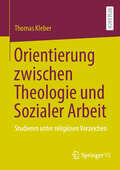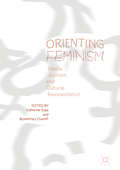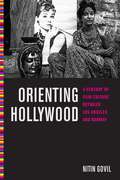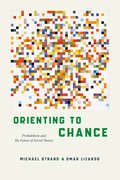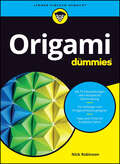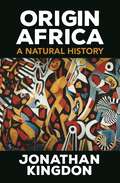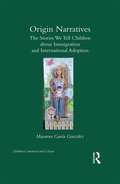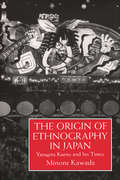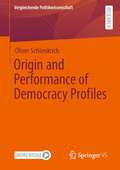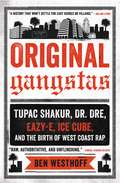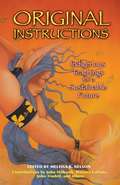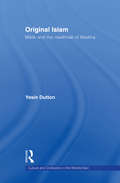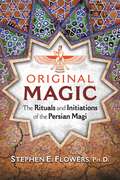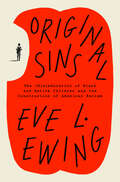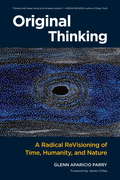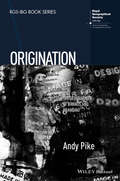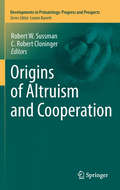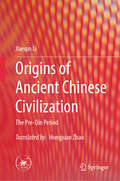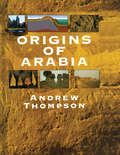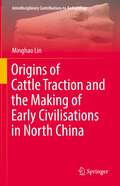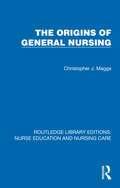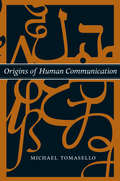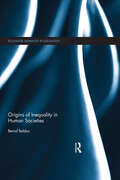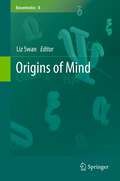- Table View
- List View
Orientierung zwischen Theologie und Sozialer Arbeit: Studieren unter religiösen Vorzeichen
by Thomas KleberDas Buch bearbeitet in einem neuen Format (Orientierungslagen) an 50 Studierenden die Fachsozialisation eines integralen Studiengangs zwischen Theologie und Sozialer Arbeit. Die Sichtweise auf die Vereinbarkeit der disziplinären Binnenlogiken ist dabei höchst subjektiv und wird, unter den Annahmen und Erwartungen der Bedeutung des Religiösen für soziales Arbeiten den Studierenden zur Herausforderung. Die individuellen Veränderungen in Elementarorientierungen während des Studiums verweisen auf aktuelle Gründe (Relationalität) und hinterfragen die gängige Aufbereitung von beruflichen Habitus-Konzepten in ihrer Fassung als Typus.
Orienting Feminism: Media, Activism And Cultural Representation
by Rosemary Overell Catherine DaleThis edited collection explores the meaning of feminism in the contemporary moment, which is constituted primarily by action but also uncertainty. The book focuses on feminist modes of activism, as well as media and cultural representation to ask questions about organising, representing and articulating feminist politics. In particular it tackles the intersections between media technologies and gendered identities, with contributions that cover topics such as twerking, trigger warnings, and trans identities. This volume directly addresses topical issues in feminism and is a valuable asset to scholars of gender, media and sexuality studies.
Orienting Hollywood: A Century of Film Culture between Los Angeles and Bombay (Critical Cultural Communication #6)
by Nitin GovilA new understanding of the culturally rich and historic relationship between Hollywood and Bollywood. With American cinema facing intense technological and financial challenges both at home and abroad, and with Indian media looking to globalize, there have been numerous high-profile institutional connections between Hollywood and Bombay cinema in the past few years. Many accounts have proclaimed India’s transformation in a relatively short period from a Hollywood outpost to a frontier of opportunity.Orienting Hollywood moves beyond the conventional popular wisdom that Hollywood and Bombay cinema have only recently become intertwined because of economic priorities, instead uncovering a longer history of exchange. Through archival research, interviews, industry sources, policy documents, and cultural criticism, Nitin Govil not only documents encounters between Hollywood and India but also shows how connections were imagined over a century of screen exchange. Employing a comparative framework, Govil details the history of influence, traces the nature of interoperability, and textures the contact between Hollywood and Bombay cinema by exploring both the reality and imagination of encounter.
Orienting to Chance: Probabilism and the Future of Social Theory
by Omar Lizardo Michael StrandExplores the implications of chance and uncertainty in social theory and offers a new interpretation of the sociological canon. Since the founding of the discipline, sociologists have endeavored to understand the structures of groups, organizations, and societies, and how these entities condition our behavior. While some of the foundational theorists saw these processes as largely deterministic, sociological theory has increasingly insisted on the importance of culture in shaping our position in and responses to social groups. In Orienting to Chance, sociologists Michael Strand and Omar Lizardo aim to show that the social order bears an unmistakable link to chance and urge us to think about how it conditions our actions. Strand and Lizardo provide a sweeping overview of a new social theory framework that they call probabilism. Using examples of probabilism in sociology, particularly in the work of Max Weber, W. E. B. Du Bois, and Pierre Bourdieu, they describe probabilism’s place in multiple fields of science. As the authors argue, their effort at redefinition and recovery helps position sociology as a field of the future, while also keeping it grounded in core issues of action, structure, culture, inequality, and inequity. By sharing these groundbreaking insights and revealing wider theoretical claims about mortality, fate, and technology in the contemporary era, Strand and Lizardo demonstrate how probabilism is an essential intervention for understanding the inevitable role of uncertainty in social life.
Origami für Dummies (Für Dummies)
by Nick RobinsonMehr als nur Papiertiger Wollten Sie schon immer die uralte Kunst des Origami meistern? Dann ist dieses Buch genau das Richtige für Sie. Verständliche Schritt-für-Schritt-Anleitungen, bestehend aus Abbildungen und begleitendem Text, helfen Ihnen dabei, ein langweiliges Stück Papier in die verschiedensten Origami-Modelle zu verwandeln. Egal ob Anfänger oder Fortgeschrittener - für jeden ist das richtige dabei. Dabei gibt der Autor auch allgemeine Tipps zur perfekten Faltung, zum Erstellen eigener Modelle und verrät, was zu tun ist, wenn Sie mal nicht weiterwissen. So werden auch Sie zum Origami-Meister. Sie erfahren Wie Sie Grundformen falten und Papier einteilen Wie Sie neue Origami-Modelle entwerfen Wie Sie auch knifflige Modelle meistern Wie Sie mithilfe von Origami Spinnen lebend aus Ihrer Wohnung entfernen
Origin Africa: A Natural History
by Jonathan KingdonA richly illustrated journey through the evolution of Africa’s extraordinary natural world across deep timeOrigin Africa is a unique introduction to the natural history and evolution of the most misrepresented continent on Earth. Celebrated evolutionary biologist and artist Jonathan Kingdon, a leading expert on the natural history of Africa, tells this extraordinary story as no one else can. Featuring a wealth of photographs and illustrations, the book is both a visual and narrative feast.Africa is the richest continent, containing every habitat from desert to tropical forest and the widest range of plants and animals found anywhere. It has experienced extraordinary climate fluctuations, meteor bombardment, and cataclysmic volcanic eruptions. Yet life has not only survived but evolved almost countless species. One group of primates evolved out of this crucible and moved out of Africa to dominate every continent on Earth. Africa has properties that ensure that most of human evolution couldn’t have occurred anywhere else.A fascinating story told as never before, Origin Africa chronicles how the natural conditions of Africa enabled a spectacular evolution of plants and animals, including Homo sapiens.
Origin Narratives: The Stories We Tell Children About Immigration and International Adoption (Children's Literature and Culture)
by Macarena Garcia-GonzalezThe first of its kind, this volume unpacks the cultural construction of transnational adoption and migration by examining a sample of recent children’s books that address the subject. Of all European countries, Spain is the nation where immigration and transnational adoption have increased most steeply from the early 1990s onward. Origin Narratives: The Stories We Tell Children About Immigration and International Adoption sheds light on the way contemporary Spanish society and its institutions re-define national identity and the framework of cultural, political and ethnic values, by looking at how these ideas are being transmitted to younger generations negotiating a more heterogeneous environment. This study collates representations of diversity, migration, and (colonial) otherness in the texts, as well as their reception by the adult mediators, through reviews, paratexts, and opinions collected from interviews and participant observation. In this new work, author Macarena Garcia Gonzalez argues that many of the texts at the wider societal discourse of multiculturalism, which have been warped into a pedagogical synthesis, underwrite the very racism they seek to combat. Comparing transnational adoption with discourses about immigration works as a new approach to the question of multiculturalism and makes a valuable contribution to an array of disciplines.
Origin Of Ethnography In Japan
by Minoru KawadaYanagita Kunio (1872-1962) is widely known as the founder of folklore studies in Japan, and his achievement in presenting a systematic framework for the discipline is highly valued amongst academic writings. However, many of his ideas still need to be examined, and in recent years there has been a renewal of interest in his works, especially among scholars of intellectual history. This re-evaluation of his achievements is generally attributable to the current view that Yanagita retained an independent position as an intellectual struggling to solve the various problems that dominated Japan in the years of great change from Meiji and Taisho to Showa. First published in 1993. Routledge is an imprint of Taylor & Francis, an informa company.
Origin and Performance of Democracy Profiles (Vergleichende Politikwissenschaft)
by Oliver SchlenkrichThis study has two central research questions: Do democracy profiles affect policy performance? And what causes democracy profiles? Oliver Schlenkrich conceptualizes and measures different democracy profiles (e.g., libertarian-majoritarian or egalitarian-majoritarian democracies) based on trade-offs between the central democracy dimensions of political freedom, political equality, and political and legal control. In addition, the study conceptually and empirically develops a typology of political performance. Regarding the first research question, the empirical analyses of about 80 democracies from 1974 to 2017 indicate that there is not an overall better performing democracy profile. Thereby, the democracy profiles do not have an immediate effect, instead their effects require a longer period of time to manifest. With respect to the second research question, the empirical findings show that several structural and cultural factors are relevant (e.g., British heritage or a competitive culture). This work is mainly based on Bayesian statistics to cope with the complexity of the data and models.About the authorOliver Schlenkrich works currently on the DFG research project ‘Causes of Transformation and Democracy Profiles: Empirical Findings of the Democracy Matrix’ located at the Institute of Political Science and Sociology, University of Wuerzburg, Germany. His research interests concern democracy, political culture, political participation, quality of statehood, and quantitative methods.
Original Gangstas: The Untold Story of Dr. Dre, Eazy-E, Ice Cube, Tupac Shakur, and the Birth of West Coast Rap
by Ben Westhoff"Raw, authoritative, and unflinching ... An elaborately detailed, darkly surprising, definitive history of the LA gangsta rap era."---Kirkus, starred reviewA monumental, revealing narrative history about the legendary group of artists at the forefront of West Coast hip-hop: Eazy-E, Dr. Dre, Ice Cube, Snoop Dogg, and Tupac Shakur.Amid rising gang violence, the crack epidemic, and police brutality, a group of unlikely voices cut through the chaos of late 1980s Los Angeles: N.W.A. Led by a drug dealer, a glammed-up producer, and a high school kid, N.W.A gave voice to disenfranchised African Americans across the country. And they quickly redefined pop culture across the world. Their names remain as popular as ever--Eazy-E, Dr. Dre, and Ice Cube. Dre soon joined forces with Suge Knight to create the combustible Death Row Records, which in turn transformed Snoop Dogg and Tupac Shakur into superstars.Ben Westhoff explores how this group of artists shifted the balance of hip-hop from New York to Los Angeles. He shows how N.W.A.'s shocking success lead to rivalries between members, record labels, and eventually a war between East Coast and West Coast factions. In the process, hip-hop burst into mainstream America at a time of immense social change, and became the most dominant musical movement of the last thirty years. At gangsta rap's peak, two of its biggest names--Tupac and Biggie Smalls--were murdered, leaving the surviving artists to forge peace before the genre annihilated itself. Featuring extensive investigative reporting, interviews with the principal players, and dozens of never-before-told stories, Original Gangstas is a groundbreaking addition to the history of popular music.
Original Instructions: Indigenous Teachings for a Sustainable Future
by Melissa K. NelsonIndigenous leaders and other visionaries suggest solutions to today’s global crisis • Original Instructions are ancient ways of living from the heart of humanity within the heart of nature • Explores the convergence of indigenous and contemporary science and the re-indigenization of the world’s peoples • Includes authoritative indigenous voices, including John Mohawk and Winona LaDukeFor millennia the world’s indigenous peoples have acted as guardians of the web of life for the next seven generations. They’ve successfully managed complex reciprocal relationships between biological and cultural diversity. Awareness of indigenous knowledge is reemerging at the eleventh hour to help avert global ecological and social collapse. Indigenous cultural wisdom shows us how to live in peace--with the earth and one another.Original Instructions evokes the rich indigenous storytelling tradition in this collection of presentations gathered from the annual Bioneers conference. It depicts how the world’s native leaders and scholars are safeguarding the original instructions, reminding us about gratitude, kinship, and a reverence for community and creation. Included are more than 20 contemporary indigenous leaders--such as Chief Oren Lyons, John Mohawk, Winona LaDuke, and John Trudell. These beautiful, wise voices remind us where hope lies.
Original Islam: Malik and the Madhhab of Madina (Culture and Civilization in the Middle East)
by Yasin DuttonOriginal Islam investigates the primacy of Madinan Islam and the madhhab (school of law) of its main exponent, Malik ibn Anas. It contains an annotated translation of Intisar al-faqir al-salik li-tarjih madhhab al-Imam al-kabir Malik, which was written by al-Ra'i, a fifteenth-century Andalusian scholar resident in Cairo. This book includes: a comprehensive section on the scholarly credentials of the great eighth-century Madinan jurist Malik ibn Anas a detailed examination of a number of theoretical and practical disputed legal issues examples of the inter-madhhab rivalry and prejudice prevalent in fifteenth-century Cairo an extensive introduction giving background information on al-Ra’i and his life and times. It also highlights the significance of the text for contemporary Muslim discourse, in which both "modernist" and "fundamentalist" elements often equate the concept of madhhab with an outmoded tradition which must be rejected as irrelevant to the practice of Islam in a globalized world. This book aims to put this ongoing controversy about madhhab, particularly the Maliki madhhab and its "pre-madhhab" Madinan origins, on a surer footing. Original Islam provides access to a hitherto little known area of Islamic law and is essential reading for those with interests in this area.
Original Magic: The Rituals and Initiations of the Persian Magi
by Stephen E. FlowersA complete guide to the theory, practice, and history of Mazdan magic, the first organized system of magic • Provides a complete curriculum of magical study and initiation centered on exercises keyed to the sacred Zoroastrian calendar • Details advanced magical rituals and practices based on archaic Persian formulas, including fire rituals and divine invocations • Explores the history and lore of Persian magic, explaining how the author reconstructed the original Mazdan system of magic Stephen Flowers explores the history, theory, practice, rituals, and initiations of the Mazdan magical system practiced by the Magi of ancient Persia, who were so skilled and famed for their effectiveness that their name came to mean what we today call “magic.” The prestige and reputation of the Magian priests of Mazda is perhaps most iconically recorded in the Christian story of the Three Wise Men who visited newborn Jesus. The author explains how the religious branch of the Mazdan magical system, founded by the Prophet Zarathustra, is known in the West under the name Zoroastrianism. He reveals how the Zoroastrian religion, which acts as a matrix for the symbols and formulas of the original form of magic, has existed for almost four thousand years with roots going back even deeper into the Indo-European past. The author reveals how all other known systems of magic have borrowed from this tradition, providing the clues that enabled him to reformulate the original Mazdan system. He reviews what the Greeks, Romans, Hebrews, Christians, and Chinese said about the Iranian-Persian tradition of the Mazdans and their invention of a magical technology. He explains how the ultimate aim of the original form of magic was not only individual wisdom, self-development, and empowerment, but also the overall betterment of the world. Outlining the theoretical principles of this method, which can be applied in practical ways to deepen the effectiveness of these magical operations, the author details a complete curriculum of magical study and initiation based on a series of graded exercises keyed to the sacred Zoroastrian calendar. He then offers a series of more advanced magical rituals and practices based on archaic Persian formulas, including fire rituals and divine invocations. Providing a manual for the original magical system used by the members of the Great Fellowship, this book guides you toward the comprehensive practice of the Mazdan philosophy, the ultimate outcome of which is ushta: Happiness.
Original Sins: The (Mis)education of Black and Native Children and the Construction of American Racism
by Eve L. Ewing“A fascinating and eye-opening look at how American schools have helped build and reinforce an infrastructure of racial inequality . . . a must-read for every American parent and educator.”—Esquire (Most Anticipated Books of 2025) <p> “Though the argument of this book is bleak, it illuminates a path for a more just future that is nothing short of dazzling.”—Oprah Daily (Most Anticipated Books of 2025) <p> “This book will transform the way you see this country.”—Michelle Alexander, author of The New Jim Crow. <p> If all children could just get an education, the logic goes, they would have the same opportunities later in life. But this historical tour de force makes it clear that the opposite is true: The U.S. school system has played an instrumental role in creating and upholding racial hierarchies, preparing children to expect unequal treatment throughout their lives. <p> In Original Sins, Ewing demonstrates that our schools were designed to propagate the idea of white intellectual superiority, to “civilize” Native students and to prepare Black students for menial labor. Education was not an afterthought for the Founding Fathers; it was envisioned by Thomas Jefferson as an institution that would fortify the country’s racial hierarchy. Ewing argues that these dynamics persist in a curriculum that continues to minimize the horrors of American history. The most insidious aspects of this system fall below the radar in the forms of standardized testing, academic tracking, disciplinary policies, and uneven access to resources. By demonstrating that it’s in the DNA of American schools to serve as an effective and underacknowledged mechanism maintaining inequality in this country today, Ewing makes the case that we need a profound reevaluation of what schools are supposed to do, and for whom. This book will change the way people understand the place we send our children for eight hours a day. <b>New York Times Bestseller</b>
Original Thinking
by James O'Dea Glenn Aparicio ParryIn Original Thinking, Glenn Aparicio Parry delves into the evolution of Western thought to recover the living roots of wisdom that can correct the imbalances in our modern worldview. Inspired by groundbreaking dialogues that the author organized between Native American elders and leading-edge Western scientists to explore the underlying principles of the cosmos, this book offers a radical revisioning of how we think. Asking questions such as, Is it possible to come up with an original thought?, What does it mean to be human?, and How has our thinking created our world today?, Parry challenges us to consider many of our most basic assumptions. To think originally--as in thinking new thoughts that have never been thought or said before--is according to Parry, largely an illusion. So, too, is the idea of linear human progress. Most of us have traveled far from our ancestral lands, and in so doing, lost connection with place, the origin of our consciousness.Original Thinking offers a radical revisioning of how we think and what it means to be human. It invites us to reintegrate our hearts with our heads and to expand our self-imposed narrowing of consciousness. In doing so we reconnect with the living, original source--nature and her interconnected elements and cycles--and embrace the communion of old and new, rational and intuitive, and masculine and feminine. Ultimately, Parry shows us how to create the tapestry of truly original thinking and to restore thought as a blessing, as a whole and complete transmission from Spirit.ContentsPART ONE (ORIGIN): Is it possible to come up with an original thought?Chapter 1. Original Thought, Time, and the Unfolding of ConsciousnessChapter 2. Looking Backward to Go ForwardChapter 3. Wheels Within Wheels Chapter 4. It's About Time PART TWO (DEPARTURE): What does it mean to be human? Chapter 5. Purpose, Potential, and Responsibility of Being Human Chapter 6. Rational Thought and Human Identity Chapter 7. Re-thinking Language Chapter 8. Beyond Rationality Chapter 9. A Tale of Two Directions PART THREE (RETURN): How has our thinking created the world today,and what is emerging? Chapter 10. The Essence of Thought Chapter 11. To Make Thought Whole Again Chapter 12. To Think Without Separation Chapter 13. Re-Thinking the "Dismal Science" Chapter 14. Toward An Original Economics PART FOUR (RENEWAL): Can education promote the renewal of original thinking? Chapter 15. Education as Renewal Chapter 16. Childhood and EducationChapter 17. Higher Education Chapter 18. A New (and Ancient) Vision Chapter 19. A Vision for Higher Education
Origination: The Geographies of Brands and Branding (RGS-IBG Book Series)
by Andy PikeOrigination: The Geographies of Brands and Branding offers innovative theoretical and conceptual frameworks relating to the ways that actors create meaning and value in commodity brands and branding through processes of geographical association. Provides innovative conceptualization and theorization to facilitate an understanding of the geographical dimensions of brands and branding Challenges current interpretations of brands as vehicles of homogenization in globalization Establishes the theoretical and conceptual foundations of a more geographically sensitive approach through rigorous empirical examination of the under-researched geographical differentiation of commodity brands and branding Presents innovative new research and analysis of the socio-spatial biographies of the Newcastle Brown Ale, Burberry and Apple brands Forges strong new connections between political and cultural economy approaches within geography Provides a distinctive and incisive conceptual and theoretical framework capable of engaging other branded commodities and their branding in other times and places
Origins and Destinations: The Making of the Second Generation
by Roger Waldinger Renee Luthra Thomas SoehlThe children of immigrants continue a journey begun by their parents. Born or raised in the United States, this second generation now stands over 20 million strong. In this insightful new book, immigration scholars Renee Luthra, Thomas Soehl, and Roger Waldinger provide a fresh understanding the making of the second generation, bringing both their origins and destinations into view. Using surveys of second generation immigrant adults in New York and Los Angeles, Origins and Destinations explains why second generation experiences differ across national origin groups and why immigrant offspring with the same national background often follow different trajectories. Inter-group disparities stem from contexts of both emigration and immigration. Origin countries differ in value orientations: immigrant parents transmit lessons learned in varying contexts of emigration to children raised in the U.S. A system of migration control sifts immigrants by legal status, generating a context of immigration that favors some groups over others. Both contexts matter: schooling is higher among immigrant children from more secular societies (South Korea) than among those from more religious countries (the Philippines). When immigrant groups enter the U.S. migration system through a welcoming door, as opposed to one that makes authorized status difficult to achieve, education propels immigrant children to better jobs. Diversity is also evident among immigrant offspring whose parents stem from the same place. Immigrant children grow up with homeland connections, which can both hurt and harm: immigrant offspring get less schooling when a parent lives abroad, but more schooling if parents in the U.S. send money to relatives living abroad. Though all immigrants enter the U.S. as non-citizens, some instantly enjoy legal status, while others spend years in the shadows. Children born abroad, but raised in the U.S. are all everyday Americans, but only some have become de jure Americans, a difference yielding across-the-board positive effects, even among those who started out in the same country. Disentangling the sources of diversity among today’s population of immigrant offspring, Origins and Destinations provides a compelling new framework for understanding the second generation that is transforming America.
Origins of Altruism and Cooperation
by Robert W. Sussman C. Robert CloningerThis book is about the evolution and nature of cooperation and altruism in social-living animals, focusing especially on non-human primates and on humans. Although cooperation and altruism are often thought of as ways to attenuate competition and aggression within groups, or are related to the action of "selfish genes", there is increasing evidence that these behaviors are the result of biological mechanisms that have developed through natural selection in group-living species. This evidence leads to the conclusion that cooperative and altruistic behavior are not just by-products of competition but are rather the glue that underlies the ability for primates and humans to live in groups. The anthropological, primatological, paleontological, behavioral, neurobiological, and psychological evidence provided in this book gives a more optimistic view of human nature than the more popular, conventional view of humans being naturally and basically aggressive and warlike. Although competition and aggression are recognized as an important part of the non-human primate and human behavioral repertoire, the evidence from these fields indicates that cooperation and altruism may represent the more typical, "normal", and healthy behavioral pattern. The book is intended both for the general reader and also for students at a variety of levels (graduate and undergraduate): it aims to provide a compact, accessible, and up-to-date account of the current scholarly advances and debates in this field of study, and it is designed to be used in teaching and in discussion groups. The book derived from a conference sponsored by N.S.F., the Wenner-Gren Foundation for Anthropological Research, the Washington University Committee for Ethics and Human Values, and the Anthropedia Foundation for the study of well-being.
Origins of Ancient Chinese Civilization: The Pre-Qin Period
by Xueqin LiThis book presents detailed research regarding the Xia, Shang, and Zhou dynasties, including studies of inscriptions on bones or tortoise shells, bronzeware, bamboo scripts, and silk manuscripts, in order to demonstrate the main features of various historical periods during the establishment and development of ancient Chinese civilization based on an a view of ancient Chinese civilization studies as a whole. The book consists of three sections with a total of 38 essays. The first section provides a macro-level overview of the formation and development history of ancient Chinese civilization; the second section, covering general topics, examines the specific characteristics of early Chinese civilization, from Emperors Yan and Huang to the Eastern Zhou Dynasty. Lastly, the appendix features 7 articles, including a short biography of the author.
Origins of Arabia
by Andrew ThompsonFirst Published in 2000. Routledge is an imprint of Taylor & Francis, an informa company.
Origins of Cattle Traction and the Making of Early Civilisations in North China (Interdisciplinary Contributions to Archaeology)
by Minghao LinThis book is the first to apply systematic palaeopathological, archaeological and historical investigations (using bones as a focus as well as other supporting lines of information) to Chinese osteological materials in order to answer the question about the origins of cattle labour. Structurally, this monograph flows from an introduction and review of previous scholarship and questions, through employed theory and developed methods, to analyses of archaeological materials, and finally finishes by overall discussion and closing remarks.Topics covered in this monograph include the significance of the study of cattle traction in North China, understanding and research into cattle traction within history, art and archaeology, and identifying traction in cattle bones. The author also uses the Pathological Index-refined (PIr) and morphometrics to test the reliability of both methods in identifying traction in cattle bones. The author applies both methods to archaeological sites in the Yellow River region. This book is of interest to researchers studying the Late Bronze Age and zooarchaeology.
Origins of General Nursing (Routledge Library Editions: Nurse Education and Nursing Care)
by Christopher MaggsOriginally published in 1983 this book examines the beginnings of the nursing profession in its present form through one generation of general hospital nurses, Voluntary and Poor Law based, who were recruited and trained between 1881 and 1914. As such, they were the first to go through a co-ordinated and standardised training programme. This study is concerned with the way in which women chose and were chosen to be general nurses and the consequences that their decisions subsequently had for the profession. Unlike previous books on nursing history, this study addresses itself to the history of nursing techniques, to the changing attitudes towards nurses and patients and to the popular contemporary image of nurses over the years.
Origins of Human Communication (Jean Nicod Lectures)
by Michael TomaselloA leading expert on evolution and communication presents an empirically based theory of the evolutionary origins of human communication that challenges the dominant Chomskian view. Human communication is grounded in fundamentally cooperative, even shared, intentions. In this original and provocative account of the evolutionary origins of human communication, Michael Tomasello connects the fundamentally cooperative structure of human communication (initially discovered by Paul Grice) to the especially cooperative structure of human (as opposed to other primate) social interaction. Tomasello argues that human cooperative communication rests on a psychological infrastructure of shared intentionality (joint attention, common ground), evolved originally for collaboration and culture more generally. The basic motives of the infrastructure are helping and sharing: humans communicate to request help, inform others of things helpfully, and share attitudes as a way of bonding within the cultural group. These cooperative motives each created different functional pressures for conventionalizing grammatical constructions. Requesting help in the immediate you-and-me and here-and-now, for example, required very little grammar, but informing and sharing required increasingly complex grammatical devices. Drawing on empirical research into gestural and vocal communication by great apes and human infants (much of it conducted by his own research team), Tomasello argues further that humans' cooperative communication emerged first in the natural gestures of pointing and pantomiming. Conventional communication, first gestural and then vocal, evolved only after humans already possessed these natural gestures and their shared intentionality infrastructure along with skills of cultural learning for creating and passing along jointly understood communicative conventions. Challenging the Chomskian view that linguistic knowledge is innate, Tomasello proposes instead that the most fundamental aspects of uniquely human communication are biological adaptations for cooperative social interaction in general and that the purely linguistic dimensions of human communication are cultural conventions and constructions created by and passed along within particular cultural groups.
Origins of Inequality in Human Societies (Routledge Advances in Sociology)
by Bernd BaldusSince the beginning of social life human societies have faced the problem how to distribute the results of collaborative activities among the participants. The solutions they found ranged from egalitarian to unequal but caused more dissension and conflict than just about any other social structure in human history. Social inequality also dominated the agenda of the new field of sociology in the 19th century. The theories developed during that time still inform academic and public debates, and inequality continues to be the subject of much current controversy. Origins of Inequality begins with a critical assessment of classical explanations of inequality in the social sciences and the political and economic environment in which they arose. The book then offers a new theory of the evolution of distributive structures in human societies. It examines the interaction of chance, intent and unforeseen consequences in the emergence of social inequality, traces its irregular historical path in different societies, and analyses processes of social control which consolidated inequality even when it was costly or harmful for most participants. Because the evolution of distributive structures is an open process, the book also explores issues of distributive justice and options for greater equality in modern societies. Along with its focus on social inequality the book covers topics in cultural evolution, social and economic history and social theory. This book will appeal to scholars and advanced students of sociology, economics and anthropology – in particular sociological theory and social inequality.
Origins of Mind
by Liz SwanThe big question of how and why mindedness evolved necessitates collaborative, multidisciplinary investigation. Biosemiotics provides a new conceptual space that attracts a multitude of thinkers in the biological and cognitive sciences and the humanities who recognize continuity in the biosphere from the simplest to the most complex organisms, and who are united in the project of trying to account for even language and human consciousness in this comprehensive picture of life. The young interdiscipline of biosemiotics has so far by and large focused on codes, signs and sign processes in the microworld--a fact that reflects the field's strong representation in microbiology and embryology. What philosophers of mind and cognitive scientists can contribute to the growing interdiscipline are insights into how the biosemiotic weltanschauung applies to complex organisms like humans where such signs and sign processes constitute human society and culture.
